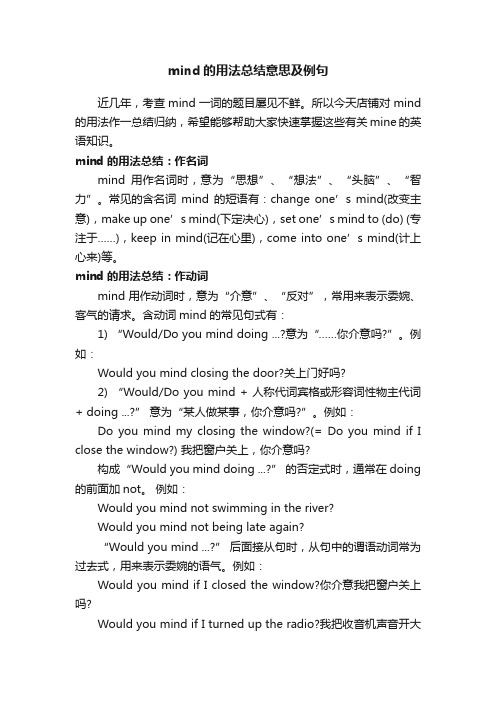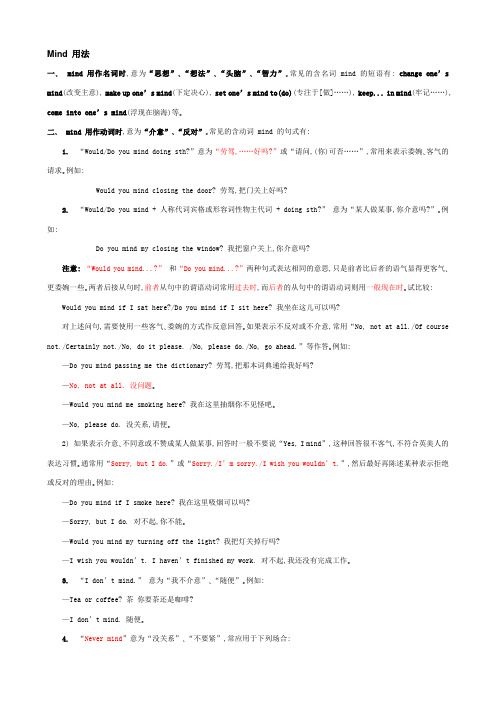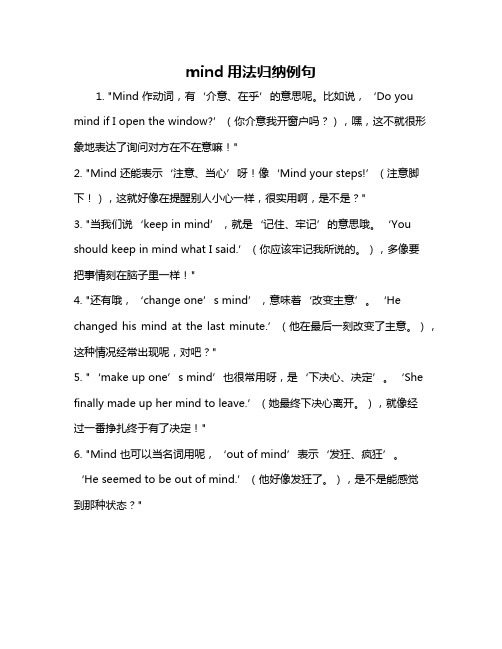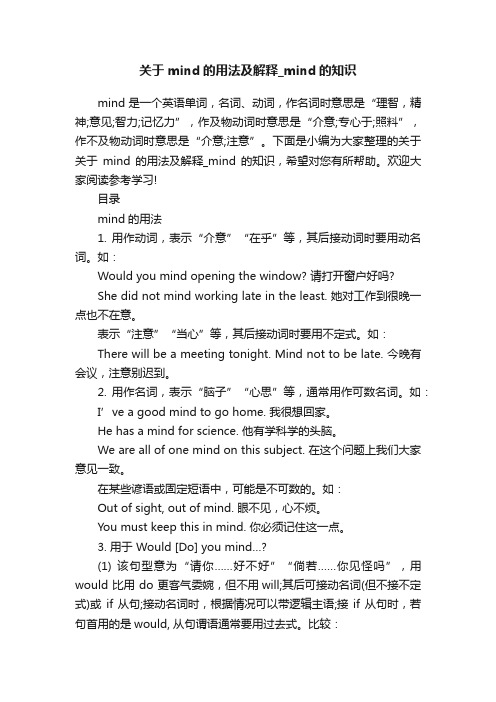复习mind用法小结
中考英语专题复习mind用法小结

中考英语专题复习mind用法小结mind是兼类词,既可用作动词,又可用作名词。
(一)mind用作动词1、意为“当心、注意、留心”,后跟名词或从句,也可单独使用。
Would you pleasemind your intonation when you speak.?请你说话时注意语调,好吗?2、意为“介意、在乎”,主要用于疑问句、否定句或条件句中,后接名词、动名词或从句。
Ireally don’t mind a joke, but this is going too far.我真的并不介意开玩笑,但这玩笑太过分了。
Do you mind my smoking here?你介意我抽烟吗?Do you mind if I copy your homework?我抄你家庭作业,你介意吗?——I’m sorry I step on your foot.对不起,我踩了你的脚。
——Never mind.不要紧。
此时常见的句式有:①“Would/Do you mind doing something?”意为“劳驾,……好吗?”或“请问,(你)可否……?”常用来表示委婉、客气的请求。
如:Would you mind taking the new books to the classroom?劳驾,把书拿到教室好吗?② “Would/Do you mind + 人称代词宾格或形容词性物主代词 + doing something?” 意为“某人做某事,你介意吗?”。
如:Do you mind my closing the window?我把窗户关上,你介意吗?需要注意的是:①“Would you mind...?”和“Do you mind...?”两种句式表达相同的意思,只是前者比后者的语气显得更客气、更委婉一些。
②对上述问句,需要使用一些客气、委婉的方式作反意回答。
如果表示不反对或不介意,常用“No, not at all./Of coursenot./Certainly not./No, do it please. /No, please do./No, go ahead.”等作答。
mind的用法整理

mind的用法整理mind有留心;注意;头脑;精神等意思,那么你知道mind的常见用法都有哪些吗?下面店铺给大家整理了一些有关mind的用法和短语例句,欢迎大家参考学习!mind的用法整理mind的用法1:作动词1.意为"当心;注意",后跟名词或从句,也可单独使用.如:Mind the step!小心台阶!Now mind!You must hurry home.注意啦!你必须赶快回家.2.意为"介意;在乎",主要用于疑问句和否定句.①作及物动词,后面通常接名词、代词、复合结构、V-ing形式、从句等.如:Would you mind my closing the window?你介意我关上窗户吗?注意:Do (Would) you mind doing sth.这一句型通常用来表示请他人做某事,常译为\"可否请你做.\"或\"劳驾你做.\",多用Would开头,用Do的情况较少.Would you mind making some room for the patient?请你给这位病人让点儿地方出来行吗?②作不及物动词.如:Do you mind if I call you later?我晚一点儿打电话给你好吗?mind的用法2:作名词1.可表示“头脑,精神,理智”“注意力,心思”“意向,想法”,可用作可数名词,也可用作不可数名词; 表示“智力”“记忆(力)”是不可数名词。
2.也可表示“有才智的人”。
mind的用法短语:change one\'s mind 改变主意;keep...in mind记住never mind不要紧have a good mind to非常想…;极有意…make up one's mind决心;决定put sb.in mind of sb.or sth.使想起;提醒(某人)call to mind回忆起;记起never you mind没你的事mind的用法例句:1. The opportunity had gone. His mind scrabbled for alternatives.机会已经失去。
mind用法

mind用法如下:一、"mind"用作名词时,意为“思想”、“想法”、“头脑”、“智力”。
常见的含名词mind的短语有:change one's mind(改变主意),make up one's mind(下定决心),keep in mind( 记在心里) ,come into one' s mind( 计上心来) 等。
二、"mind"用作动词时,意为“介意”、“反对”,常用来表示委婉、客气的请求。
1、“Would / Do you mind doing ... ?意为“……你介意吗?”。
例如:Would you mind closing the door ?关上门好吗?2、“Would / Do you mind + 人称代词宾格或形容词性物主代词+ doing ... ?”意为“某人做某事,你介意吗?”。
例如:Do you mind my closing the window ?(= Do you mind if I close the window ?) 我把窗户关上,你介意吗?3、构成“Would you mind doing ... ?”的否定式时,通常在doing 的前面加not 。
例如:Would you mind not swimming in the river ?4、“Would you mind ... ?”后面接从句时,从句中的谓语动词常为过去式,用来表示委婉的语气。
例如:Would you mind if I closed the window ?你介意我把窗户关上吗?5、“Would you mind ... ?”的同义句式是“Do you mind ... ?”。
二者表达相同的意思,只是“Would you mind ... ?”比“Do you mind ... ?”语气显得更客气一些。
两者后接从句时,前者从句中的谓语动词常为过去式,而后者从句中的谓语动词则用一般现在时。
mind用法有哪些用法和例句

mind⽤法有哪些⽤法和例句mind⽤作名词时可表⽰“头脑,精神,理智”“注意⼒,⼼思”“意向,想法”,可⽤作可数名词,也可⽤作不可数名词;表⽰“智⼒”“记忆(⼒)”是不可数名词。
mind动词基本含义是“留⼼”“注意”“当⼼”,强调全⼼全意去注意。
可⽤作及物动词,也可⽤作不及物动词,⽤作及物动词时,接名词、代词、动词不定式(多为否定式)、动名词或that/wh-从句作宾语。
mind⽤法详解⼀、⽤作动词表⽰“介意”、“在乎”等,其后接动词时要⽤动名词;表⽰“注意”、“当⼼”等,其后接动词时要⽤不定式。
如:Do you mind helping us? 请你帮我们⼀下忙好吗?I’m sure he wouldn’t mind your going with us. 我肯定他不会反对你同我们⼀起去。
⼆、⽤作名词表⽰“脑⼦”、“⼼思”等,通常⽤作可数名词。
如:I’ve a good mind to go home. 我很想回家。
He has a mind for science. 他有学科学的头脑。
三、⽤于 Would [Do] you mind...?1、该句型意为“请你……好不好?”、“倘若……你见怪吗?”,⽤would ⽐⽤ do 更客⽓委婉,但通常不⽤ will;其后可接动名词(但不接不定式)或 if从句;接动名词时,根据情况可以带逻辑主语;接if 从句时,若句⾸⽤的是 Would,从句谓语通常要⽤过去式。
2、对该句型的回答与汉语的习惯不同,注意回答是针对 mind ⽽⾔的,即:(1)表⽰不同意,可⽤:Yes, I do mind./Please don’t... / Betternot, please. / I’d rather you didn’t./I’m sorry, but... 等。
(2)表⽰同意,可⽤:Oh, no, please. / No, not at all./Not at all.Certainly not. / Of course not. / No, go ahead. 等。
mind的用法总结意思及例句

mind的用法总结意思及例句近几年,考查mind一词的题目屡见不鲜。
所以今天店铺对mind 的用法作一总结归纳,希望能够帮助大家快速掌握这些有关mine的英语知识。
mind的用法总结:作名词mind用作名词时,意为“思想”、“想法”、“头脑”、“智力”。
常见的含名词mind的短语有:change one’s mind(改变主意),make up one’s mind(下定决心),set one’s mind to (do) (专注于……),keep in mind(记在心里),come into one’s mind(计上心来)等。
mind的用法总结:作动词mind用作动词时,意为“介意”、“反对”,常用来表示委婉、客气的请求。
含动词mind的常见句式有:1) “Would/Do you mind doing ...?意为“……你介意吗?”。
例如:Would you mind closing the door?关上门好吗?2) “Would/Do y ou mind + 人称代词宾格或形容词性物主代词+ doing ...?” 意为“某人做某事,你介意吗?”。
例如:Do you mind my closing the window?(= Do you mind if I close the window?) 我把窗户关上,你介意吗?构成“Would you mind doing ...?” 的否定式时,通常在doing 的前面加not。
例如:Would you mind not swimming in the river?Would you mind not being late again?“Would you mind ...?” 后面接从句时,从句中的谓语动词常为过去式,用来表示委婉的语气。
例如:Would you mind if I closed the window?你介意我把窗户关上吗?Would you mind if I turned up the radio?我把收音机声音开大点,你反对吗?“Would you mind ...?” 的同义句式是“Do you mind ...?”。
初中八年级英语高频考点词mind的使用

初中八年级英语高频考点词mind的使用(1)作动词,意为“介意;关心”,通常用于疑问句、否定句中。
可单独使用,也可接名词、代词、v-ing或从句。
常用结构:mind (not) doing sth. 介意(不)做某事Would /Do you mind +(one's) doing sth?你介意(某人)做……吗?Would /Do you mind if +从句? “你介意……吗?”表示不介意:Of course not./Certainly not./Not at all.表示介意:I'm sorry./You'd better not./I'm afraid…如:Would/Do you mind if I call you later?你介意我晚点打电话给你吗?Of course not. 当然不介意。
(2)作名词,意为“思想,想法”。
常见短语:change one's mind 改变主意;make up one's mind 下决心;keep…in mind 牢记……如:Out of sight, out of mind.眼不见,心不烦。
He changed his mind when he heard all thefacts.当他听到所有事实后他改变了主意。
They're both lovely -I can' make up my mind.它们两个都很可爱-我还拿不定主意。
Let's have a try.【考点归纳】mind的用法1. Would you mind my turning up the TV? The New Year concert has just begun.______.Just go aheadA. Please don'tB. Better notC. Im afraid notD. Of course not2. -Miss Gao, I am feeling bored. Would you mind my____here?You’d better not, for smoking is forbidden in public nowA smokes.B to smokeC smokingD smoke3. Nick, would you mind___ those old Jeans?They look terrible.A.hot to wear.B.not wearc.wearing not D.not wearing初中英语考点句型So I do和So do I的使用so do I =me too我也是So I do=yes,that`s me.我确实这样So I do是附和上边所说的话,意思是“是的”。
mind用法

Mind 用法一、 mind 用作名词时,意为“思想”、“想法”、“头脑”、“智力”。常见的含名词 mind 的短语有: change one’s mind(改变主意), make up one’s mind(下定决心),set one’s mind to(do)(专注于[做]……), keep... in mind(牢记……), come into one’s mind(浮现在脑海)等。二、 mind 用作动词时,意为“介意”、“反对”。常见的含动词 mind 的句式有:1. “Would/Do you mind doing sth?”意为“劳驾,……好吗?”或“请问,(你)可否……”,常用来表示委婉、客气的请求。例如:Would you mind closing the door? 劳驾,把门关上好吗?2.“Would/Do you mind + 人称代词宾格或形容词性物主代词+ doing sth?” 意为“某人做某事,你介意吗?”。例如:Do you mind my closing the window? 我把窗户关上,你介意吗?注意: “Would you mind...?”和“Do you mind...?”两种句式表达相同的意思,只是前者比后者的语气显得更客气、更委婉一些。两者后接从句时,前者从句中的谓语动词常用过去时,而后者的从句中的谓语动词则用一般现在时。试比较: Would you mind if I sat here?/Do you mind if I sit here? 我坐在这儿可以吗?对上述问句,需要使用一些客气、委婉的方式作反意回答。如果表示不反对或不介意,常用“No, not at all./Of course not./Certainly not./No, do it please. /No, please do./No, go ahead.”等作答。例如:—Do you mind passing me the dictionary? 劳驾,把那本词典递给我好吗?—No, not at all. 没问题。—Would you mind me smoking here? 我在这里抽烟你不见怪吧。—No, please do. 没关系,请便。2) 如果表示介意、不同意或不赞成某人做某事,回答时一般不要说“Yes, I mind”,这种回答很不客气,不符合英美人的表达习惯。通常用“Sorry, but I do.”或“Sorry./I’m sorry./I wish you wouldn’t.”,然后最好再陈述某种表示拒绝或反对的理由。例如:—Do you mind if I smoke here? 我在这里吸烟可以吗?—Sorry, but I do. 对不起,你不能。—Would you mind my turning off the light? 我把灯关掉行吗?—I wish you wouldn’t. I haven’t finished my work. 对不起,我还没有完成工作。3. “I don’t mind.” 意为“我不介意”、“随便”。例如:—Tea or coffee? 茶你要茶还是咖啡?—I don’t mind. 随便。4. “Never mind”意为“没关系”、“不要紧”,常应用于下列场合:1) 回答对方的致歉。例如:—I’m sorry. I came in a hurry and forgot to bring food. 对不起,我来得匆忙,忘记带吃的了。—Never mind. You can have ours. 没关系,你可以吃我们的。2) 安慰对方。例如:—Did you watch the baseball match yesterday? 昨天你看棒球比赛了吗?—No, I missed it. By the time I got there, it had already finished. 没有,我错过了。当我到达那里时,比赛已经结束了。—Never mind. It was a boring match. 没关系。那是一场枯燥乏味的比赛。3) 回答对方的求助。例如:—Sorry to trouble you. 抱歉,麻烦您一下。—Never mind. What can I do for you? 没关系。我能为你做些什么呢?[链接中考]1. Would you mind_____more slowly? I can’t follow you.A. speakB. spokeC. spokenD. speaking2. Do you mind_____the radio a little bit? I am doing my homework.A. turning offB. to turn downC. turning downD. turning up3. —Would you mind opening the window?—_____.A. Of course, open itB. Not at allB. CertainlyC. No, don’t do it4. —Do you mind if I take the seat?—_____. It’s for a gentleman named Bill.A. Better notB. Never mindC. Of courseD. Not at all5. —It’s too hot. Would you mind my_____the window?—_____. Do it as you like, please!A. to open; OKB. opening; Certainly notC. closing; Of courseD. open; Good idea6. —Would you mind my smoking here?—_____.A. Not at allB. I have no ideaC. Yes, please7. Would you mind_____me how_____English words?A. tell; to rememberB. telling; rememberC. telling; to rememberD. tell; remember8. —Mary is ill. When shall we go to see her, tonight or tomorrow night?—_____. Either night is OK.A. I’m sureB. I’m afraid notC. I d on’t knowD. I don’t mind9. —I’m terribly sorry to have stepped on your foot.—_____.A. Don’t say thatB. Never mindC. You’re welcomeD. That’s right10. —Do you mind opening the door for me?—_____.A. Yes, of course notB. Yes, pleaseC. No, of course notD. No, you can’t open it Key: 1-5 DCBAB6-10 ACDBC(注:专业文档是经验性极强的领域,无法思考和涵盖全面,素材和资料部分来自网络,供参考。
mind用法详解总结

Certainly not. 当然不介意。
Of course not. 当然不介意。
No, not at all. 一点也不介意。
No, I don’t mind at all. 一点也不介意。
2. 表示不同意 (即介意)的答语:
Yes, I do mind. 是的,我介意。
Better not , please . 请最好不要……
Id rather you didnt. 我宁愿你不要……
三、特殊用法
Do you mind ... ... 还可以表示气愤或反感。意为“请别这样做”,“别来这一套”“你怎么搞的”
例:
Do you mind ? I dont want to hear that kind of language here.
3、可以说Do you mind... ...? 也可以说 Would you mind... ...? 但不能说Will you mind... ...?
二、答语
1、表示同意(不介意)的答语:
No,thats all right. 不介意,没关系。
No, go ahead , please. 不介意,请吧。
我在这儿抽烟你介意吗?
正:Would [Do] you mind my smoking here?
正:Do you mind if I smoke here?
正:Would you mind if I smoked here?
2. 对该句型的回答与汉语的习惯不同,注意回答是针对 mind 而言的,即:
mind用法详解总结
mind 用法详解
一、用作动词
mind用法详解总结

mind用法详解总结今天给大家带来mind 用法详解,快来一起学习吧,下面就和大家分享,来欣赏一下吧。
mind 用法详解一、用作动词表示“介意”、“在乎”等,其后接动词时要用动名词;表示“注意”、“当心”等,其后接动词时要用不定式。
如:Do you mind helping us? 请你帮我们一下忙好吗?I’m sure he wouldn’t mind your going with us. 我肯定他不会反对你同我们一起去。
There will be a meeting tonight. Mind not to be late. 今晚有会议, 注意别迟到。
二、用作名词表示“脑子”、“心思”等,通常用作可数名词。
如:I’ve a good mind to go home. 我很想回家。
He has a mind for science. 他有学科学的头脑。
We are all of one mind on this subject. 在这个问题上我们大家意见一致。
注:在某些谚语或固定短语中,可能是不可数的。
如:Out of sight, out of mind. 眼不见,心不烦。
You must keep this in mind. 你必须记住这一点。
三、用于Would [Do] you mind...?1. 该句型意为“请你……好不好?”、“倘若……你见怪吗?”,用would 比用do 更客气委婉,但通常不用will;其后可接动名词(但不接不定式)或if从句;接动名词时,根据情况可以带逻辑主语;接if 从句时,若句首用的是Would,从句谓语通常要用过去式。
比较:我在这儿抽烟你介意吗?正:Would [Do] you mind my smoking here?正:Do you mind if I smoke here?正:Would you mind if I smoked here?2. 对该句型的回答与汉语的习惯不同,注意回答是针对mind 而言的,即:(1)表示不同意,可用:Yes, I do mind./Please don’t... / Betternot, please. / I’d rather you didn’t./I’m sorry, but... 等。
mind 的用法

mind 的用法“mind”是一个英语单词,有多个含义和用法。
以下是一些常见的用法:1. 作为名词,表示“头脑”、“智力”、“思维”。
例如:She has a lively mind. 她思维敏捷。
He has a weak mind. 他意志薄弱。
2. 作为动词,表示“介意”、“关心”、“注意”。
例如:Do you mind if I smoke? 你介意我抽烟吗?She minds very much what people think of her. 她很在意别人对她的看法。
3. 与介词搭配使用,表示“在...方面用心”、“集中精力”。
例如:I must mind my own business. 我必须管好自己的事。
He minds the baby while his wife is out. 他妻子外出时,他照看孩子。
4. 表示“建议”、“劝告”。
例如:Mind your own business! 少管闲事!Mind the steps, they're slippery. 当心台阶,很滑。
5. 与其他动词或短语搭配使用,表示“专心致志”、“注意”、“留心”。
例如:Mind the traffic when crossing the road. 过马路时注意车辆。
Mind the gap between the train and the platform. 注意列车与站台之间的空隙。
6. 表示“介意”、“在乎”。
例如:Do you mind if I use your phone? 你介意我用你的电话吗?She doesn't mind what she eats as long as it's filling. 她不在乎吃什么,只要能填饱肚子就行。
mind的用法和搭配

mind的用法和搭配mind用作名词意为“思想;头脑;智力”。
用作动词意为“介意;焦虑”。
常见的含mind的短语有:change one’s mind(改变主意),make up one’s mind(下定决心),set one’s mind to do (专注于……)。
扩展资料1.用作动词表示“介意”、“在乎”等,其后接动词时要用动名词;表示“注意”、“当心”,后接动词时要用不定式,例如:(1)Do you mind helping us?请你帮我们一下好吗?(2)I’m sure he wouldn’t mind your going with us.我肯定他不会反对你同我们一起去。
2.用作名词表示“脑子”、“心思”等,通常用作可数名词,例如:(1)I’ve good mind to go home.我很想回家。
(2)He has a mind for science.他有学科学的头脑。
3.用于句型Would(Do)you mind...?(1)该句型意为“请你……好不好?”、“倘若……你见怪吗?”,用would比用do更委婉,但通常不同will;其后可接动名词(但不接不定式)或if从句;接动名词时,根据情况可以带逻辑主语;接if从句时,若句首用的`would,从句谓语通常要用过去式。
Would you mind if I turned on the TV?我打开电视你介意吗?Would you mind me smoking here?我在这儿抽烟你介意吗?(2)表示不同意:Yes,I do mind./Please don’t.../Better not,please./I’d rather you didn’t./I’m sorry,but...等。
—Would you mind my turning off the light?我把灯关掉,你介意吗?—I’m sorry. I haven’t finished my work. (= I wish you wouldn’t. I haven’t finished my work.) 对不起,我还没有完成我的工作.(3)表示同意:Oh,no,please./No,not at all./Not at all./Certainly not./Of course not./No,go ahead.等。
mind用法归纳例句

mind用法归纳例句1. "Mind 作动词,有‘介意、在乎’的意思呢。
比如说,‘Do you mind if I open the window?’(你介意我开窗户吗?),嘿,这不就很形象地表达了询问对方在不在意嘛!"2. "Mind 还能表示‘注意、当心’呀!像‘Mind your steps!’(注意脚下!),这就好像在提醒别人小心一样,很实用啊,是不是?"3. "当我们说‘keep in mind’,就是‘记住、牢记’的意思哦。
‘You should keep in mind what I said.’(你应该牢记我所说的。
),多像要把事情刻在脑子里一样!"4. "还有哦,‘change one’s mind’,意味着‘改变主意’。
‘He changed his mind at the last minute.’(他在最后一刻改变了主意。
),这种情况经常出现呢,对吧?"5. "‘make up one’s mind’也很常用呀,是‘下决心、决定’。
‘She finally made up her mind to leave.’(她最终下决心离开。
),就像经过一番挣扎终于有了决定!"6. "Mind 也可以当名词用呢,‘out of mind’表示‘发狂、疯狂’。
‘He seemed to be out of mind.’(他好像发狂了。
),是不是能感觉到那种状态?"7. "‘in one’s mind’就是‘在某人心里、在脑海中’。
‘The picture is always in my mind.’(那幅画面一直在我脑海中。
),就好像它一直存在那儿一样让人难忘!"我的观点结论:Mind 的用法真的很多样,在不同的情境中能表达丰富的含义,大家一定要好好掌握呀!。
mind的用法总结

mind的用法总结Mind 的用法总结Mind 这个词在英语中有着多种用法和含义,从表示思维和理解的能力,到表示关注和注意的态度。
本文将就 Mind 的用法总结,并探讨其在不同语境下的含义和应用。
一、Mind 的基本含义Mind 是一个多义词,在最基本的含义下,它表示人类的思维能力和意识活动。
它涵盖了思考、理解、判断、记忆等方方面面的智力活动。
例如,在解决问题时,我们需要集中我们的思想和注意力。
我们可以说,我们在思考或集中我们的 mind。
二、Mind 的注意和关心的含义Mind 还可以表示关注、关心和重视的态度。
当我们说 "Mindyour own business" 时,我们的目的是告诉别人不要干涉我们的事情,不要过多关注或干涉他人的事务。
另外,当我们对别人的行为或态度不满意时,我们可以说 "I don't mind",这意味着我们对此事不在意或无所谓。
三、Mind 的请求和建议的含义Mind 还可以用来表示请求、提醒和建议。
当我们说 "Do you mind if I join you?" 时,我们是在征求对方的同意,询问是否可以加入他们的活动或讨论中。
这是一种有礼貌和尊重的表达方式。
另外,我们还可以使用 "I mind" 这个短语来提醒他人注意某事。
比如,在街道上,我们可能会对过马路的人喊道 "Mind the traffic!",提醒他们要注意来往的车辆。
四、Mind 的身心健康的含义Mind 还与身心健康有关。
在日常生活中,我们强调身心健康的重要性。
我们可以说 "a healthy mind in a healthy body" 来强调身心健康的紧密联系。
另外,当我们感到紧张或焦虑时,我们可能会抱怨 "I can't get it out of my mind",这意味着某事牵扯到我们的思想和情感。
关于mind的用法及解释_mind的知识

关于mind的用法及解释_mind的知识mind是一个英语单词,名词、动词,作名词时意思是“理智,精神;意见;智力;记忆力”,作及物动词时意思是“介意;专心于;照料”,作不及物动词时意思是“介意;注意”。
下面是小编为大家整理的关于关于mind的用法及解释_mind的知识,希望对您有所帮助。
欢迎大家阅读参考学习!目录mind的用法1. 用作动词,表示“介意”“在乎”等,其后接动词时要用动名词。
如:Would you mind opening the window? 请打开窗户好吗?She did not mind working late in the least. 她对工作到很晚一点也不在意。
表示“注意”“当心”等,其后接动词时要用不定式。
如:There will be a meeting tonight. Mind not to be late. 今晚有会议,注意别迟到。
2. 用作名词,表示“脑子”“心思”等,通常用作可数名词。
如:I’ve a good mind to go home. 我很想回家。
He has a mind for science. 他有学科学的头脑。
We are all of one mind on this subject. 在这个问题上我们大家意见一致。
在某些谚语或固定短语中,可能是不可数的。
如:Out of sight, out of mind. 眼不见,心不烦。
You must keep this in mind. 你必须记住这一点。
3. 用于Would [Do] you mind…?(1) 该句型意为“请你……好不好”“倘若……你见怪吗”,用would 比用 do 更客气委婉,但不用will;其后可接动名词(但不接不定式)或if从句;接动名词时,根据情况可以带逻辑主语;接if 从句时,若句首用的是would, 从句谓语通常要用过去式。
比较:我在这儿抽烟你介意吗?正:Would [Do] you mind my smoking here?正:Do you mind if I smoke here?正:Would you mind if I smoked here?(2) 对该句型的回答与汉语的习惯不同,注意回答是针对 mind 而言的,即:①表示不同意,可用:Yes, I do mind. / Please don’t… / Better not, please. / I’d rather you didn’t. / I’m sorry, but...等。
(完整版)mind的用法

几年,考查mind一词的题目屡见不鲜。
现对其用法作一归纳:一、mind用作名词时,意为“思想”、“想法”、“头脑"、“智力”。
常见的含名词mind的短语有:change one's mind(改变主意),make up one’s mind(下定决心),set one's mind to (do) (专注于……),keep in mind(记在心里),come into one’s mind (计上心来)等。
二、mind用作动词时,意为“介意”、“反对”,常用来表示委婉、客气的请求。
含动词mind的常见句式有:1)“Would/Do you mind doing ...?意为“……你介意吗?”。
例如:Would you mind closing the door?关上门好吗?2)“Would/Do you mind + 人称代词宾格或形容词性物主代词 + doing 。
?”意为“某人做某事,你介意吗?”.例如: Do you mind my closing the window?(= Do you mind if I close the window?) 我把窗户关上,你介意吗?构成“Would you mind doing ...?”的否定式时,通常在doing的前面加not。
例如:Would you mind not swimming in the river?Would you mind not being late again?“Would you mind 。
.?”后面接从句时,从句中的谓语动词常为过去式,用来表示委婉的语气。
例如:Would you mind if I closed the window?你介意我把窗户关上吗?Would you mind if I turned up the radio?我把收音机声音开大点,你反对吗?“Would you mind ...?”的同义句式是“Do you mind .。
20XX年关于mind的用法及解释

20XX年关于mind的用法及解释mind的用法1. 用作动词,表示“介意”“在乎”等,其后接动词时要用动名词。
如:Would you mind opening the window? 请打开窗户好吗?She did not mind working late in the least. 她对工作到很晚一点也不在意。
表示“注意”“当心”等,其后接动词时要用不定式。
如:There will be a meeting tonight. Mind not to be late. 今晚有会议,注意别迟到。
2. 用作名词,表示“脑子”“心思”等,通常用作可数名词。
如:I’ve a good mind to go home. 我很想回家。
He has a mind for science. 他有学科学的头脑。
We are all of one mind on this subject. 在这个问题上我们大家意见一致。
在某些谚语或固定短语中,可能是不可数的。
如:Out of sight, out of mind. 眼不见,心不烦。
You must keep this in mind. 你必须记住这一点。
3. 用于Would [Do] you mind…?1/ 4(1) 该句型意为“请你……好不好”“倘若……你见怪吗”,用would 比用do 更客气委婉,但不用will;其后可接动名词(但不接不定式)或if从句;接动名词时,根据情况可以带逻辑主语;接if 从句时,若句首用的是would, 从句谓语通常要用过去式。
比较:我在这儿抽烟你介意吗?正:Would [Do] you mind my smoking here?正:Do you mind if I smoke here?正:Would you mind if I smoked here?(2) 对该句型的回答与汉语的习惯不同,注意回答是针对mind 而言的,即:①表示不同意,可用:Yes, I do mind. / Pl ease don’t… / Better not, please. / I’d rather you didn’t. / I’m sorry, but...等。
mind用法

mind用法一.mind用作动词1.mind的基本含义是“留心”“注意”“当心”,强调全心全意去注意。
可用作及物动词,也可用作不及物动词,用作及物动词时,接名词、代词、动词不定式(多为否定式)、动名词或that/wh-从句作宾语。
2.mind作“照顾”解时,侧重于护卫和保护,使之不受伤害或发生意外,接名词或代词作宾语。
3.mind还可作“介意”“关心”“在乎”“反对”解。
主要用于疑问、否定、条件句中。
可用作不及物动词,也可用作及物动词,接名词、代词、动名词、if/that/wh-从句作宾语。
如该动词的逻辑主语不是句子的主语时,该动名词前须加物主代词、人称代词或名词的所有格表示其逻辑主体。
这时通常不可变为被动结构。
mind作“介意”解时还可接以形容词充当补足语的复合宾语。
Mind your own business!管好你自己的事!Would you mind if I smoke here?我在这吸烟,你介意吗?二.mind用作名词1.mind用作名词时可表示“头脑,精神,理智”“注意力,心思”“意向,想法”,可用作可数名词,也可用作不可数名词; 表示“智力”“记忆(力)”是不可数名词。
2.mind也可表示“有才智的人”。
3.mind有时还可表示“记得”,指通过媒介或激发力而“想起来”,接名词、代词、动名词作宾语。
I can't think where I've left my umbrella; my mind's a complete blank!我想不起来把伞丢在哪儿了,一点印象都没有!She was in a cheerful frame of mind.她心情愉快。
mind的用法和搭配

mind的用法和搭配mind用作名词意为“思想;头脑;智力”。
用作动词意为“介意;焦虑”。
常见的含mind的短语有:change one’s mind(改变主意),make up one’s mind(下定决心),set one’s mind to do (专注于……)。
1.用作动词表示“介意”、“在乎”等,其后接动词时要用动名词;表示“注意”、“当心”,后接动词时要用不定式,例如:(1)Do you mind helping us?请你帮我们一下好吗?(2)I’m sure he wouldn’t mind your going with us.我肯定他不会反对你同我们一起去。
2.用作名词表示“脑子”、“心思”等,通常用作可数名词,例如:(1)I’ve good mind to go home.我很想回家。
(2)He has a mind for science.他有学科学的头脑。
3.用于句型Would(Do)you mind...?(1)该句型意为“请你……好不好?”、“倘若……你见怪吗?”,用would比用do更委婉,但通常不同will;其后可接动名词(但不接不定式)或if从句;接动名词时,根据情况可以带逻辑主语;接if从句时,若句首用的would,从句谓语通常要用过去式。
Would you mind if I turned on the TV?我打开电视你介意吗?Would you mind me smoking here?我在这儿抽烟你介意吗?(2)表示不同意:Yes,I do mind./Please don’t.../Be tter not,please./I’d rather you didn’t./I’m sorry,but...等。
—Would you mind my turning off the light?我把灯关掉,你介意吗?—I’m sorry. I haven’t finished my work. (= I wish you wouldn’t. I haven’t finished my work.) 对不起,我还没有完成我的工作.(3)表示同意:Oh,no,please./No,not at all./Not at all./Certainly not./Of course not./No,go ahead.等。
mind+用法

mind是一个英语单词,可以用作名词和动词,有多种用法。
用作名词时,表示“头脑”、“精神”或“有才智的人”。
用作动词时,有及物动词和不及物动词两种形式。
作为及物动词时,可以接名词、代词、动名词或that/wh-从句作宾语,表示“留心”、“注意”、“当心”等意思。
例如:“Mind the gap between the train and the platform.”(小心列车和站台之间的空隙。
)
可以用作“照顾”解,侧重于护卫和保护,使之不受伤害或发生意外,只用作及物动词,接名词或代词作宾语。
例如:“I’ll mind your children while you’re away.”(你不在的时候我会照顾你的孩子的。
)
还可以表示“介意”、“关心”、“在乎”、“反对”等意思,主要用于疑问、否定、条件句中。
可以用作及物动词,也可以用作不及物动词,接名词、代词、动名词等作宾语。
例如:“I don’t mind telling you what happened.”(我不介意告诉你发生了什么。
)
还可以表示“听从”、“服从”,语气较obey弱,接名词、代词作宾语。
例如:“You should mind what your parents say.”(你应该听从你父母的话。
)表示“专心于”,只用作及物动词,接名词、代词作宾语。
例如:“She minds her studies well.”(她学习很专心。
)
此外,mind还可以与其它词语搭配构成短语,如mind control(洗脑)等。
总之,mind的用法比较多,需要根据具体语境和上下文来理解和使用。
- 1、下载文档前请自行甄别文档内容的完整性,平台不提供额外的编辑、内容补充、找答案等附加服务。
- 2、"仅部分预览"的文档,不可在线预览部分如存在完整性等问题,可反馈申请退款(可完整预览的文档不适用该条件!)。
- 3、如文档侵犯您的权益,请联系客服反馈,我们会尽快为您处理(人工客服工作时间:9:00-18:30)。
mind 用法小结
mind是兼类词,既可用作动词,又可用作名词。
(一)mind用作动词
1、意为“当心、注意、留心”,后跟名词或从句,也可单独使用。
Would you please mind your intonation when you speak.?
请你说话时注意语调,好吗?
2、意为“介意、在乎”,主要用于疑问句、否定句或条件句中,后接名词、动名词或从句。
I really don’t mind a joke, but this is going too far.
我真的并不介意开玩笑,但这玩笑太过分了。
Do you mind my smoking here?
你介意我抽烟吗?
Do you mind if I copy your homework?
我抄你家庭作业,你介意吗?
——I’m sorry I step on your foot.
对不起,我踩了你的脚。
——Never mind.
不要紧。
此时常见的句式有:
①“Would/Do you mind doing s omething?”意为“劳驾,,,好吗?”或“请问,(你)可否,,?”常用来表示委婉、客气的请求。
如:
Would you mind taking the new books to the classroom?
劳驾,把书拿到教室好吗?
②“Would/Do you mind + 人称代词宾格或形容词性物主代词 + doing something?”意为“某人做某事,你介意吗?”。
如:
Do you mind my closing the window?
我把窗户关上,你介意吗?
需要注意的是:
①“Would you mind...?”和“Do you mind...?”两种句式表达相同的意思,只是前者比
后者的语气显得更客气、更委婉一些。
②对上述问句,需要使用一些客气、委婉的方式作反意回答。
如果表示不反对或不介意,常用“No, not at all./Of course not./Certainly not./No, do it please. /No, please do./No, go ahead.”等作答。
如:
——Do you mind offering me some hot water?
劳驾,提供点热水给我好吗?
——No, not at all.
没问题。
如果表示介意、不同意或不赞成某人做某事,回答时一般不要说“Yes, I mind”,这种回
答很不客气,不符合英美人的表达习惯。
通常用“Sorry, but I do.”或“Sorry./I’m
sorry./I wish you wouldn’t, you’d better not.”,然后最好再陈述某种表示拒绝或
反对的理由。
如:
——Do you mind if I smoke here?
我在这里吸烟可以吗?
——Sorry, but I do. 对不起,你不能。
(二)mind用作名词,意为“脑子、想法”。
常见的短语有:
①change one’s mind 改变主意
Nothing can change my mind.
什么也不能改变我的想法。
②make up one’s mind作出决定
We all have made up our minds to work in the west of China.
我们都已经决定到中国西部去工作。
③keep...in mind记住,,
He has kept the experience in mind.
他已经记住这次经历。
【现场测试】
选择填空
( )1. Would you mind____ _more slowly? I can’t follow you.
A. speak
B. spoke
C. spoken
D. speaking
( )2.——Do you mind my taking this seat?
——____ _. It’s for Mr. Smith.
A. Not at all
B. Yes, please
C. Yes, of course not
D. You’d better not
( )3. ——It’s too hot. Would you mind____ _the door?
——____ _. Please do it now.
A. to open, OK
B. opening, Certainly not
C. opening, Of course
D. to open, Good idea
( )4. ——I’m terribly sorry to have stepped on your foot.
——____ _.
A. D on’t say that
B. Never mind
C. You’re welcome
D. That’s right
( )5. ——Do you mind opening the door for me?
——____ _.
A. Yes, of course not
B. Yes, please
C. No, of course not
D. No, you can’t open it
Key:1-5DDBBC
0 0。
